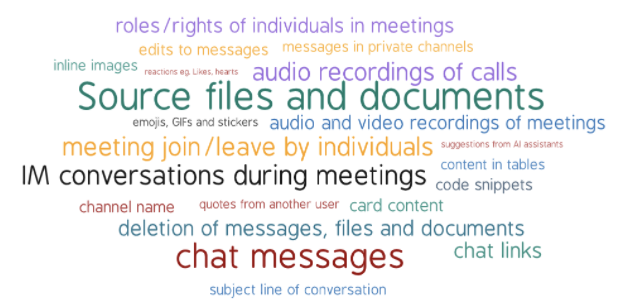Archiving and Data Protection
An independent survey by Osterman Research, and sponsored by Theta Lake, sought the views of 142 IT decision-makers in mid to large organizations using Microsoft Teams. Participants were asked in-depth questions about their organization’s capabilities and challenges in relation to archiving and protecting the many data types produced within the platform.
With 145 million daily active users, Microsoft Teams has become integral to working lives enabling employees to remain productive and connected working from anywhere. Whilst the need to work from home was cited as the most critical reason for the adoption of Microsoft Teams, implementation plans continue at pace with four out of five respondents planning an enterprise-wide rollout to all employees.

Key insights
The findings of the white paper provide useful insight and benchmarking for both IT and security professionals as well as compliance and data privacy practitioners with responsibilities for ensuring the secure and compliant retention of records.
“27% of respondents said one or more employees used Microsoft Team to attempt to circumvent compliance requirements”
- Almost all organizations are using multiple platforms including Microsoft Teams. Three out of four organisations are already archiving content from three or more sources.
- The top three drivers for archiving and protecting data in Microsoft teams are the need to comply with general data protection regulations, with industry specific regulations and retaining data for legal hold.
- Firms face multiple challenges from the adoption of Microsoft teams and other platforms including: increased volumes of data, the need for unified controls, and archiving data from multiple sources.
- Compliance and legal practitioners were two of the three least influential groups in the decision to adopt Microsoft Teams in 2020. Rapid deployment of new features is creating challenges for compliance teams to address, whilst legal teams struggle with the concept of modern attachments where only a link is preserved.
- Over the last 12 months nearly half of respondents had experienced a request requiring access to Microsoft Teams content for both internal investigations and eDiscovery purposes. Over a quarter (27%) of respondents said one or more employees used Microsoft Teams to attempt to circumvent compliance requirements.
- Respondents were concerned about content being excluded from archiving and eDiscovery, ranging from source files and documents, audio and video files of meetings to reactions and edited messages.
- There are multiple and diverse types of content that are considered extremely or very important to be able to search and produce, including: chat messages, deletions, edits, content in tables, emojis and links.
Join us on June 15 as we host Michael Sampson of Osterman Research and author of this report to discuss the results and options available to Microsoft Teams users.



